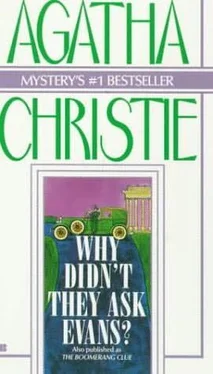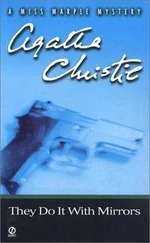Agatha Christie - Why Didn't They Ask Evans
Здесь есть возможность читать онлайн «Agatha Christie - Why Didn't They Ask Evans» весь текст электронной книги совершенно бесплатно (целиком полную версию без сокращений). В некоторых случаях можно слушать аудио, скачать через торрент в формате fb2 и присутствует краткое содержание. Жанр: Классический детектив, на английском языке. Описание произведения, (предисловие) а так же отзывы посетителей доступны на портале библиотеки ЛибКат.
- Название:Why Didn't They Ask Evans
- Автор:
- Жанр:
- Год:неизвестен
- ISBN:нет данных
- Рейтинг книги:2.5 / 5. Голосов: 4
-
Избранное:Добавить в избранное
- Отзывы:
-
Ваша оценка:
- 60
- 1
- 2
- 3
- 4
- 5
Why Didn't They Ask Evans: краткое содержание, описание и аннотация
Предлагаем к чтению аннотацию, описание, краткое содержание или предисловие (зависит от того, что написал сам автор книги «Why Didn't They Ask Evans»). Если вы не нашли необходимую информацию о книге — напишите в комментариях, мы постараемся отыскать её.
Why Didn't They Ask Evans — читать онлайн бесплатно полную книгу (весь текст) целиком
Ниже представлен текст книги, разбитый по страницам. Система сохранения места последней прочитанной страницы, позволяет с удобством читать онлайн бесплатно книгу «Why Didn't They Ask Evans», без необходимости каждый раз заново искать на чём Вы остановились. Поставьте закладку, и сможете в любой момент перейти на страницу, на которой закончили чтение.
Интервал:
Закладка:
'Oh, well,' thought Frankie, 'I've got to go through with it now. But I wish she hadn't been so nice about it.' She spent a dull afternoon and evening lying in her darkened room. Mrs Bassington-ffrench looked in once or twice to see how she was but did not stay.
The next day, however, Frankie admitted the daylight and expressed a desire for company and her hostess came and sat `with her for some time. They discovered many mutual acquaintances and friends and by the end of the day, Frankie felt, with a guilty qualm, that they had become friends.
Mrs Bassington-ffrench referred several times to her husband and to her small boy. Tommy. She seemed a simple woman, deeply attached to her home, and yet, for some reason or other, Frankie fancied that she was not quite happy. There was an `anxious expression in her eyes sometimes that did not agree with a mind at peace with itself.
On the third day Frankie got up and was introduced to the master of the house.
He was a big man, heavy jowled, with a kindly but rather abstracted air. He seemed to spend a good deal of his time shut up in his study. Yet Frankie judged him to be very fond of his wife, though interesting himself very little in her concerns.
Tommy, the small boy, was seven, and a healthy, mischievous child. Sylvia Bassington-ffrench obviously adored him.
'It's so nice down here,' said Frankie with a sigh.
She was lying out on a long chair in the garden.
'I don't know whether it's the bang on the head, or what it is, but I just don't feel I want to move. I'd like to lie here for days and days.' 'Well, do,' said Sylvia Bassington-ffrench in her calm, incurious tones. 'No, really, I mean it. Don't hurry back to town. You see,' she went on, 'it's a great pleasure to me to have you here. You're so bright and amusing. It quite cheers me up.' 'So she needs cheering up,' flashed across Frankie's mind.
At the same time she felt ashamed of herself.
'I feel we really have become friends,' continued the other woman.
Frankie felt still more ashamed.
It was a mean thing she was doing - mean - mean - mean.
She would give it up! Go back to town Her hostess went on: 'It won't be too dull here. Tomorrow my brother-in-law is coming back. You'll like him, I'm sure. Everyone likes Roger.' 'He lives with you?' 'Off and on. He's a restless creature. He calls himself the ne'er-do-weel of the family, and perhaps it's true in a way. He never sticks to a job for long - in fact I don't believe he's ever done any real work in his life. But some people just are like that - especially in old families. And they're usually people with a great charm of manner. Roger is wonderfully sympathetic. I don't know what I should have done without him this spring when Tommy was ill.' 'What was the matter with Tommy?' 'He had a bad fall from the swing. It must have been tied on to a rotten branch and the branch gave way. Roger was very upset because he was swinging the child at the time - you know, giving him high ones, such as children love. We thought at first Tommy's spine was hurt, but it turned out to be a very slight injury and he's quite all right now.' 'He certainly looks it,' said Frankie, smiling, as she heard faint yells and whoops in the distance.
'I know. He seems in perfect condition. It's such a relief.
He's had bad luck in accidents. He was nearly drowned last winter.' 'Was he really?' said Frankie thoughtfully.
She no longer meditated returning to town. The feeling of guilt had abated.
Accidents!
Did Roger Bassington-ffrench specialize in accidents, she wondered.
She said: 'If you're sure you mean it, I'd love to stay a little longer. But won't your husband mind my butting in like this?' 'Henry?' Mrs Bassington-ffrench's lips curled in a strange expression. 'No, Henry won't mind. Henry never minds anything - nowadays.' Frankie looked at her curiously.
'If she knew me better she'd tell me something,' she thought to herself. 'I believe there are lots of odd things going on in this household.' Henry Bassington-ffrench joined them for tea and Frankie studied him closely. There was certainly something odd about the man. His type was an obvious one - a jovial, sport-loving, simple country gentleman. But such a man ought not to sit twitching nervously, his nerves obviously on edge, now sunk in an abstraction from which it was impossible to rouse him, now giving out bitter and sarcastic replies to anything said to him.
Not that he was always like that. Later that evening, at dinner, he showed out in quite a new light. He joked, laughed, told stories, and was, for a man of his abilities, quite brilliant. Too brilliant, Frankie felt. The brilliance was just as unnatural and out of character.
'He has such queer eyes,' she thought. 'They frighten me a little.' And yet surely she did not suspect Henry Bassingtonffrench of anything? It was his brother, not he, who had been in Marchbolt on that fatal day.
As to the brother, Frankie looked forward to seeing him with eager interest. According to her and to Bobby, the man was a murderer. She was going to meet a murderer face to face.
She felt momentarily nervous.
Yet, after all, how could he guess?
How could he, in any way, connect her with a successfully accomplished crime?
'You're making a bogey for yourself out of nothing,' she said to herself.
Roger Bassington-ffrench arrived just before tea on the following afternoon.
Frankie did not meet him till tea time. She was still supposed to 'rest' in the afternoon.
When she came out on to the lawn where tea was laid, Sylvia said smiling: 'Here is our invalid. This is my brother-in-law. Lady Frances Derwent.' Frankie saw a tall, slender young man of something over thirty with very pleasant eyes. Although she could see what Bobby meant by saying he ought to have a monocle and a toothbrush moustache, she herself was more inclined to notice the intense blue of his eyes. They shook hands.
He said: 'I've been hearing all about the way you tried to break down the park wall.' 'I'll admit,' said Frankie, 'that I'm the world's worst driver.
But I was driving an awful old rattle-trap. My own car was laid up and I bought a cheap one secondhand.' 'She was rescued from the ruins by a very good-looking young doctor,' said Sylvia.
'He was rather sweet,' agreed Frankie.
Tommy arrived at this moment and flung himself upon his uncle with squeaks of joy.
'Have you brought me a Homby train? You said you would.
You said you would.' 'Oh, Tommy! You mustn't ask for things,' said Sylvia.
'That's all right, Sylvia. It was a promise. I've got your train all right, old man.' He looked casually at his sister-in-law. 'Isn't Henry coming to tea?' 'I don't think so.' The constrained note was in her voice. 'He isn't feeling awfully well today, I imagine.' Then she said impulsively: 'Oh, Roger, I'm glad you're back.' He put his hand on her arm for a minute.
'That's all right, Sylvia, old girl.' After tea, Roger played trains with his nephew.
Frankie watched them, her mind in a turmoil.
Surely this wasn't the sort of man to push people over cliffs!
This charming young man couldn't be a cold-blooded murderer!
But, then - she and Bobby must have been wrong all along.
Wrong, that is, about this part of it.
She felt sure now that it wasn't Bassington-ffrench who had pushed Pritchard over the cliff.
Then who was it?
She was still convinced he had been pushed over. Who had done it? And who had put the morphia in Bobby's beer?
With the thought of morphia suddenly the explanation of Henry Bassington-ffrench's peculiar eyes came to her, with their pin-point pupils.
Was Henry Bassington-ffrench a drug fiend?
CHAPTER 13 Alan Carstairs
Strangely enough, she received confirmation of this theory no later than the following day, and it came from Roger.
Читать дальшеИнтервал:
Закладка:
Похожие книги на «Why Didn't They Ask Evans»
Представляем Вашему вниманию похожие книги на «Why Didn't They Ask Evans» списком для выбора. Мы отобрали схожую по названию и смыслу литературу в надежде предоставить читателям больше вариантов отыскать новые, интересные, ещё непрочитанные произведения.
Обсуждение, отзывы о книге «Why Didn't They Ask Evans» и просто собственные мнения читателей. Оставьте ваши комментарии, напишите, что Вы думаете о произведении, его смысле или главных героях. Укажите что конкретно понравилось, а что нет, и почему Вы так считаете.












